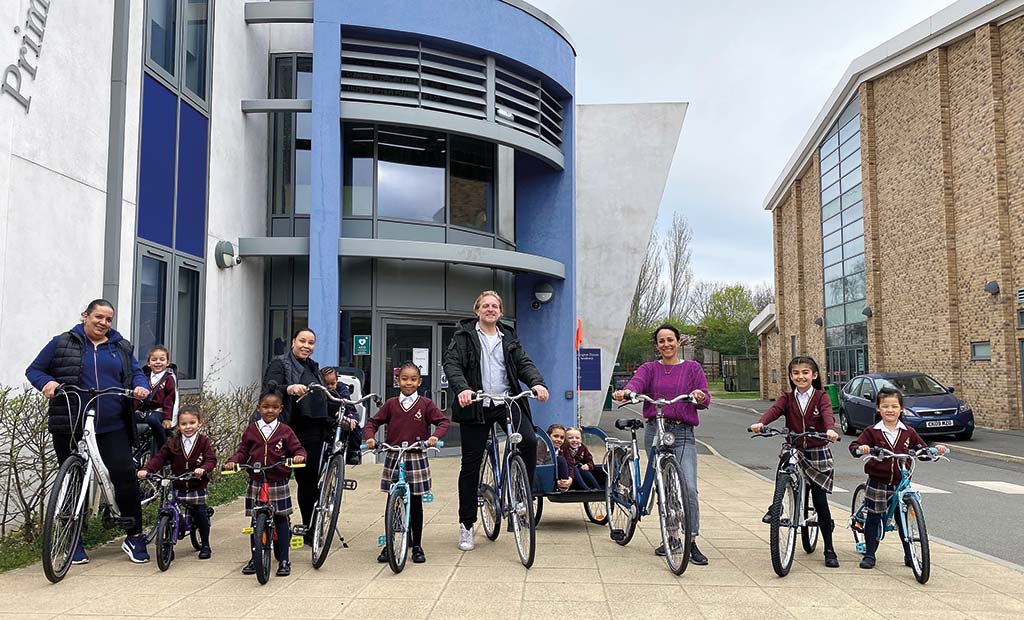The Family Cycle Library at Burlington Danes Primary Academy helps get parents and children cycling. It lends out adult and children’s bikes, seats and trailers for free for half a term, and provides training for adults at no cost.
It started when I returned to work after having my youngest child. Instead of a leisurely walk, I suddenly needed to drop one child at nursery, do the school run, then rush to the tube to get to work on time. It wasn’t easy.
I wondered if a bicycle might make me more time-efficient. I wasn’t a confident cyclist – I hadn’t been on a bike since I was a teenager – but there are cycle lanes around here, and there’s a quiet route at the back of the school. I bought a trailer and attended free training provided by the local authority. Nervously, I tried my first trips. I got a great reaction. People waved at the children in the trailer, and it was a really fun way to get about.
Identifying problems
Our school building is next to a big T-junction and isn’t geared up for lots of traffic. Every day, I’d see frustrated parents in their cars. I knew cycling wouldn’t be for everyone, but I wanted to find out what was stopping people and find practical ways to help overcome the barriers.
At work one day, I received an email about a grant that sounded ideal. Walking and Cycling Grants London is a programme funded by Transport for London in partnership with The London Marathon Charitable Trust and managed by the environmental regeneration charity, Groundwork London. The scheme awards up to £10,000 over three years to projects that encourage people of all ages and backgrounds to walk and cycle safely.
I thought the PTA might apply for funding to buy one bicycle with a trailer. But when I contacted Bikeworks, which runs free cycle training in our borough, business development manager David Dansky suggested I think bigger. He said if the funder liked our idea, they’d probably give more. So I scaled up the project to include bikes, trailers, child seats, and cycle training. David’s enthusiasm gave me the confidence I needed, and I approached the school with a plan. The head of primary, Miss Vellacott, was instantly supportive and even asked how the school could help.
Getting others on board
I knew there would be a lot of work involved so I approached another parent at the school, Matt Meckes, who is a more experienced cyclist. He was really keen to get involved so we agreed to apply for the grant and run the project together.
We knew our funding application needed to be evidence-based to be successful, so we designed a survey for parents and carers to find out how they travelled to school and what barriers there were to cycling. Only 16% of families who responded regularly cycled to school, and over half never did. The main reason for not cycling was concern about road safety, but some families didn’t have access to a bicycle. A quarter said they lacked either the money or the time to investigate how they might make the change. Storage was also an issue – a lot of our families live in flats.
Once we understood the problems, we could plan how to overcome them. As well as lending bikes, the family cycle library would provide helmets and hi-vis belts, arrange cycle training to help with confidence and lend waterproof jackets. We naïvely assumed borrowers could store bikes in the local cycle hangars, but waiting lists were too long, so we bought sturdy locks to secure them outside instead.
Obtaining funding
The pandemic made it easier to focus on the grant application because the PTA wasn’t busy planning big events. We applied for the grant in October 2020 and were awarded just under £10,000 right before Christmas. The grant is given in stages. We received £5,000 for the first year, and this December, we’ll need to demonstrate what we’ve achieved to qualify for years two (£3,000) and three (£2,000).
Matt put together a user-friendly website for the cycle library, and he worked out what to buy. With our first year’s funding, we bought four adult bikes plus two child seats, a trailer for two children and six children’s bicycles of different sizes. The lockdown in January, combined with the scarcity of bikes, meant we had to delay opening, but we were finally up and running after Easter.
It’s free to use the cycle library. Every half term, we ask interested families to fill in an online form, and we match bicycles to borrowers. When people collect their bike, we adjust the seat, show them how to lock it and check their helmet fits. Each adult is offered two training sessions for a returnable deposit of £5. After the training, the helmet and hi-vis belts are theirs to keep. If the family can’t afford the deposit, the PTA will pay instead. When bikes are returned, they are serviced before being handed to the next person.
It’s a hit
So far, 46 parents and children have benefitted from the scheme, and we’ve had lots of positive feedback. Parent Sheraine Williams says, ‘This scheme has alleviated my car driving stress and has increased my mobility, speed and access.’
In the future, we hope to run family rides where new cycling families can get to know one another. We’re also hoping to set up a buddy system so families who live near one another can cycle to school together. Our highest cost has been the bicycles, but we will need some money in the future to buy more helmets and cycle accessories and for maintenance and repair.
The cycle library has proved to be an excellent way for the PTA to connect with families and foster relationships. You can’t beat having that initial conversation with someone and then being able to meet their cycling needs.
Further grants information
- An introduction to grants
- Get your grant funding application right
- Read how grants and a community appeal helped one primary hit their target
- Join FundEd to get access to their £14m grants database








.gif)
